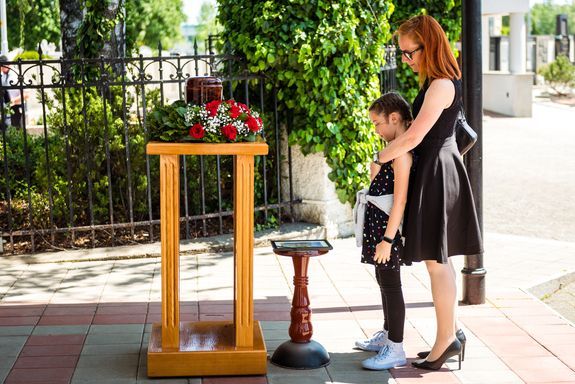How to Have the Cremation Conversation with Your Family
When was the last time you talked about death with your family? Probably not recently, most likely. Only around 25 percent of people have had the disposition conversation with their loved ones, but research shows that death is worth talking about. Informing family members about disposition preferences means they don’t have to make the difficult decisions themselves.
The subject of this conversation is increasingly turning to cremation. Cremation services have overtaken traditional funeral burials as the number one disposition choice among Americans.
If you’re among the millions of Americans also interested in cremation, it’s time to have that conversation.
Addressing Disposition Resolves a Lot of Death-Related Anxiety
Whether it’s cremation or a traditional funeral and burial, there are good reasons to talk out your wishes with loved ones. It’s natural to think that such a conversation will be too uncomfortable for loved ones, but it usually goes easier than people expect.
There are two reasons for that. One, when people discuss their disposition preferences with family, they’re relieving friends and family of those difficult disposition decisions – decisions that no one wants to make when dealing with grief. Your family will be grateful for that.
Two, if you’ve already preplanned your cremation, there’s no cost-related burden to pass onto family. You’ve likely attended a funeral and wondered about who will pay for your own disposition. It’s a scary thing to think about, and it’s something your loved ones will be confronted with if disposition expenses fall to them.
If you can preplan and prepay for your cremation, that’s a major stress to take off of the family. Also, they won’t argue with your disposition choices if you’re paying for them yourself.
Five Basic Questions to Answer About Your Final Arrangements
When it’s time to open up the conversation, be ready to answer plenty of questions. This is how family will send you out, after all.
In particular, be ready to answer the four following questions:
- Why choose cremation? If your family is unsure about cremation, there’s plenty of information you can give them to resolve their concerns. For example, you might mention how cremation is much less expensive than a traditional funeral and burial. You might not want a traditional ceremony, which can feel severe for the grief-stricken. You could mention how cremation allows decedents and their family members to memorialize in their own way. You could bring up the eco-friendly nature of cremation – and direct cremation in particular – as it has a much lower impact on land resources.
Think about why you’ve chosen cremation for yourself and be ready to explain your reasons to everyone when the chance arises.
- How much does cremation cost? When discussing final arrangements, cost is inevitably brought up as a major factor. Your family will likely want to know what cremation will cost.
A traditional funeral and cremation typically cost a little bit less than a traditional funeral with burial – about $6,000 vs. $7,000 for a burial. However, direct cremation costs much less at around $1,200 on average.
If cost is a concern for family members, discussing direct cremation can help ease those concerns.
- What should a final memorial look like? Although we don’t go around talking about our ideal end-of-life ceremony, most people have given the subject serious thought. You likely have as well, and it’s possible that those wishes don’t align with traditional funeral and burial services.
If you want something more intimate or more personalized, cremation makes it easy for families to plan out such a memorial. Whether it’s a relaxed get-together among family or scattering the ashes at a beloved spot, cremation allows family members to grieve and collect themselves before giving you a proper remembrance.
- How many people will attend your memorial or disposition? This follows from the previous question, but it’s one that people typically consider separately. Again, though, with direct cremation, a memorial of any size can be arranged without rushing through the process. If your family wants to keep it small and intimate, direct cremation makes it easy. If your family wants something grand, direct cremation makes that easy, too.
- How will family know they have the right ashes? This is a common fear that people express prior to cremation. It’s also a concern that direct cremation services take seriously. First, many cremation services maintain a database for all of their clients and decedents. Second, as soon as a decedent’s remains are recovered, an identifying metal disc is secured to the decedent, and this remains with them through cremation.
The disc survives the intense heat during cremation, so it can be referenced when recovering ashes. And when it’s time to hand the cremains over, this same disc is used to for verification.
How Can People Ensure Their Cremation Wishes are Carried Out?
The vast majority of cremation conversations end well. Cremation is a dignified, versatile, unrushed, and low-cost process that most people don’t have issues with. But every family is different, and if you suspect that there will be arguments over your decision, there are steps you can take to ensure your cremation preferences are carried out. Those steps include:
- Make your wishes clear through the proper paperwork – Your disposition preferences should definitely be detailed in your will. However, this isn’t enough if you want to make absolute sure that your final wishes are observed. It’s common for wills to turn up well after the funeral or memorial, and it will be too late by then. To ensure this doesn’t happen to you, write your disposition preferences down in a separate document that can be quickly retrieved after passing. Let your loved ones know where this document is so they can locate it right away.
- Name a trusted family member to act as power of attorney – If you have any final wishes at all to consider – including disposition – someone will need to confirm those wishes. That’s why the recommendation is to grant someone a durable power of attorney in your will and any document that specifies your cremation preferences. This person will have the final say on healthcare decisions if you become incapacitated, and disposition. For obvious reasons, this person should be someone you trust.
- Consider preplanning your cremation through a service provider – Preplanning and prepaying for cremation is a compelling way to get your disposition wishes across. It’s highly unlikely that your family will contend with your decision if it’s already paid for, and if an argument develops over your final wishes, your preplanned cremation services will be a major point in your favor, should the discussion require mediation.
Death is an Uncomfortable Subject, But the Conversation is Worth Having
One of the great things about the death discussion is that you should only need to address it a couple of times before it’s settled. That’s the hope, anyway, to address your cremation decision, inform loved ones, and move on to the next conversational topic.
However, most families find that addressing a loved one’s
future disposition is easier than it seems. And that’s especially true for people who have carefully considered their disposition options. If you walk into the talk well-informed about cremation and all of its benefits, you’ll leave loved ones with valuable peace of mind.





